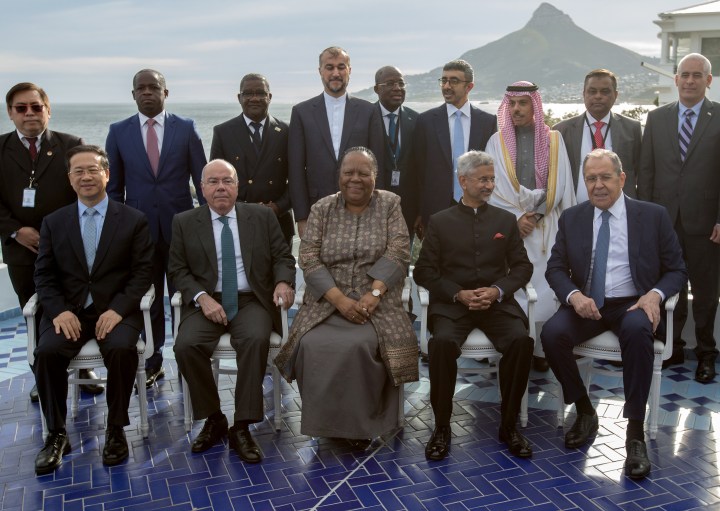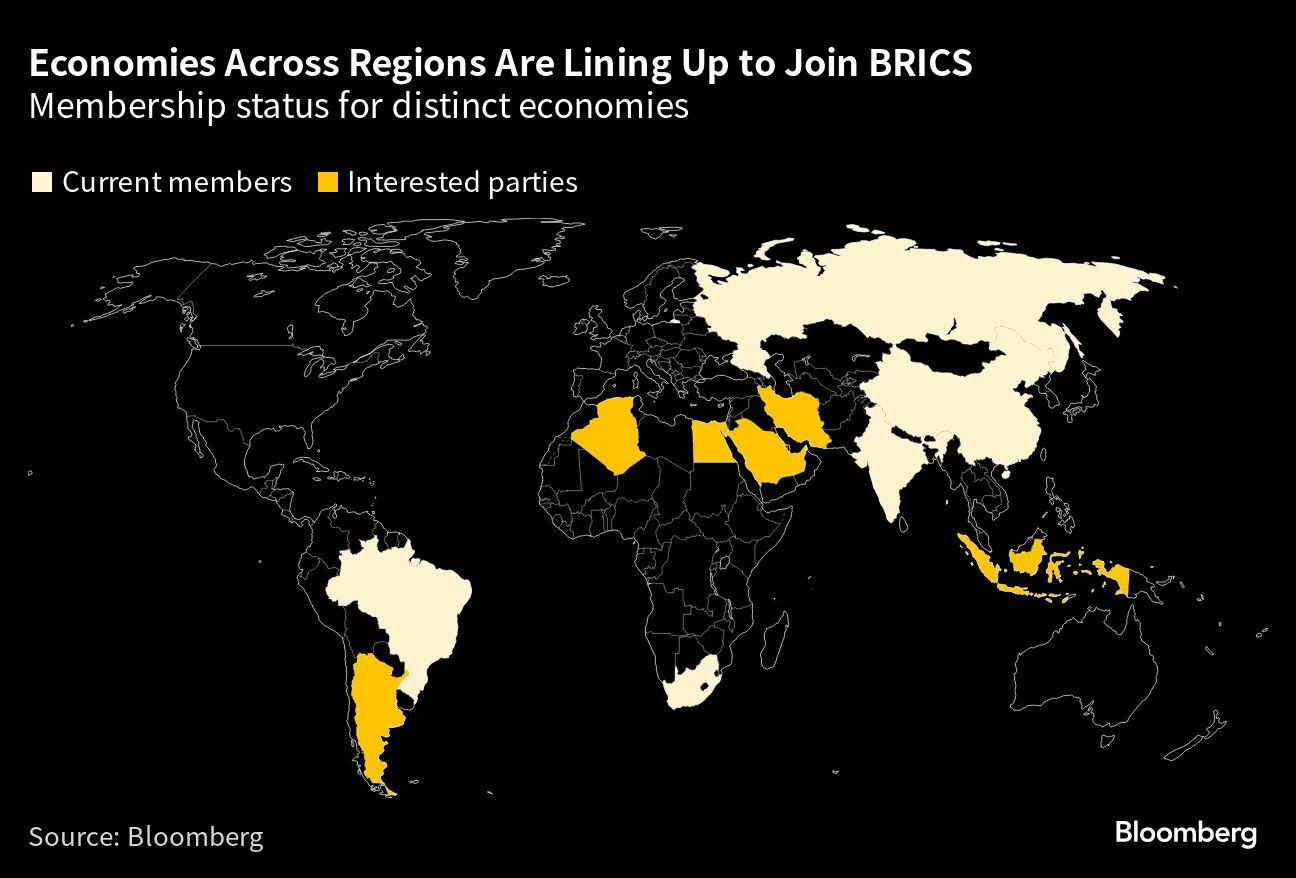ISS TODAY OP-ED
Extra BRICS members should be about more than the ‘West versus the Rest’

Interest in joining BRICS has soared, with 23 official formal applications.
This year’s Brazil-Russia-India-China-South Africa (BRICS) summit will have a distinctive African flavour. Hosted by its only African member, the meeting has an African theme and will be attended by many African leaders as part of an outreach programme. It is expected to consider at least six African countries’ applications for membership.
The theme of the 22-24 August summit is “BRICS and Africa: Partnership for Mutually Accelerated Growth, Sustainable Development, and Inclusive Multilateralism”. Sixty-seven leaders from the global south have been invited. Significantly, French president Emmanual Macron — who told Pretoria he would like to attend — hasn’t been invited.
Interest in joining BRICS has surged. At a briefing this week, South Africa’s international relations Minister Naledi Pandor said while several more nations had shown interest, 23 had formally applied. These were Algeria, Argentina, Bangladesh, Bahrain, Belarus, Bolivia, Cuba, Egypt, Ethiopia, Honduras, Indonesia, Iran, Kazakhstan, Kuwait, Morocco, Nigeria, State of Palestine, Saudi Arabia, Senegal, Thailand, United Arab Emirates, Venezuela and Vietnam.
Pandor said this indicated recognition of BRICS as a champion of the global south, and the benefits of membership. South Africa’s BRICS ‘sherpa’ Anil Sooklal believes one reason for seeking membership now is the growing polarisation impelled by Russia’s war on Ukraine and rising United States-China tensions. These create anxiety among smaller nations, and an impetus to seek “security in numbers”.
Not all six African governments that formally applied have officially confirmed this. Algeria, Egypt and Ethiopia have — but Nigeria, Senegal and Morocco’s positions are unclear.
Nigeria’s Ambassador to Russia, Abdullahi Shehu, was recently quoted as saying accession talks hadn’t commenced, but he didn’t rule out future membership. However, Nigeria’s Guardian cites several experts as saying Nigeria isn’t ready for BRICS membership. They say it lacks economic sophistication — including having little to export to other BRICS countries besides oil. Also, the new reformist Bola Tinubu administration has much on its plate.
Nigeria analyst and Chief Executive of Africa @ Work Dianna Games told ISS Today she was surprised to see Nigeria on the list, but added: “Tinubu is very proactive, so it’s possible he could be driving something like that, looking to spread influence because Nigeria has turned quite inwards under Buhari in foreign policy, and perhaps he is trying to regain lost ground in terms of influence”.
What each African country hopes to get from BRICS is diverse and somewhat unclear. Egypt would probably be among the first to join, especially as it’s already a member of BRICS’ New Development Bank. Cairo is particularly interested in BRICS’ plans to shift more trade from the US dollar into local currencies — and even perhaps to create its own currency.
Algeria’s president Abdelmadjid Tebboune sees joining as helping to create a more equitable world order, which would help Algeria distance itself ‘from the attraction of the two poles.’ His foreign minister recently expressed hopes for deriving trade benefits.
These views reveal common misconceptions about BRICS. The two poles Tebboune referred to — which are growing further apart due to the Ukraine war — are clearly the West on the one side and Russia and China on the other. So BRICS can hardly be called non-aligned.
And seeing BRICS as a useful trade booster misses the fact that it’s not a trade bloc at all. Pandor highlighted that BRICS countries have around 42% of the world’s population and 30% of its territory, 27% of global GDP and 20% of international trade. But only about 6% of the total trade of the five members is with each other.

BRICS is nonetheless a useful economic club — most concretely through its New Development Bank, which has already loaned $5.4-billion to South Africa for five projects. But viewed geopolitically, BRICS is less of a non-aligned “champion of the global south” as Pandor put it this week, than an alternative to a Western-dominated world, as Tebboune says — or even, more pointedly, anti-Western.
This is a prickly point. Pandor said South Africa didn’t “see BRICS as being pro-Russia or anti-Western … South Africa’s trading partners in the West are very, very important to South Africa’s economic progress”. Games also didn’t think Nigeria would join BRICS to tip the global power balance against the West, as it valued all its main trading partners equally.
Priyal Singh, Institute for Security Studies Senior Researcher, says the motivation for BRICS membership differs even among current members. “India, for example, has consistently pointed to its pursuit of ‘strategic autonomy’ on the world stage; and a stronger (or enlarged) BRICS grouping aligns with this foreign policy objective. This is also a compelling narrative for Brazil and South Africa, with Pretoria leaning heavily into its pursuit of a more multipolar international order narrative.”
But as tensions rise over Ukraine and Taiwan, Russia and China increasingly appear to regard BRICS as an alliance against the West, and so presumably would some candidate members like Iran and Venezuela.
Yet such an alliance has its own fault lines, most notably the tensions between China and India, especially over their Kashmir border dispute. Last week South African President Cyril Ramaphosa reportedly called Indian Prime Minister Narendra Modi to persuade him that it was worth attending the summit in person.
And it’s not coincidental that Russia and China, BRICS’ two autocratic members, are apparently most enthusiastic about expanding membership while democratic India and Brazil are wary (with South Africa in the middle), a South African official said off the record.
This seems to be why the five BRICS members’ foreign ministers are still struggling, days before the summit, to agree on membership criteria to submit to the heads of state. Defining the bloc’s identity and global role has also become a struggle.
“I certainly would guard against any criteria for expansion that would lead us down a path where we contribute to increasing conflict in the global community or in any part of the world,” Pandor said. That is probably not how China and Russia see the issue.
BRICS offers benefits to its members, including more choices in development financing, collaboration on issues such as health, and gradual independence from the dollar’s dominance. But anyone contemplating membership must be wary about the danger of going down precisely the path that Pandor warned against. DM
Peter Fabricius, Consultant, Institute for Security Studies (ISS) Pretoria.
First published by ISS Today.


















 Become an Insider
Become an Insider
BRICs. How long before a new Molotov-von Ribbentorp pact is signed?
BRICs doesn’t want a strong Africa, an Africa which can and wil defend itself against all comers…..